Leadership and Management Strategies in the Service Industry: A Report
VerifiedAdded on 2022/11/28
|12
|3384
|367
Report
AI Summary
This report provides a detailed analysis of leadership and management practices within the Intercontinental Hotels Group (IHG), a multinational hospitality company. It begins by exploring various classical management theories relevant to the hospitality industry, such as bureaucratic, scientific, behavioral, and human relations theories. The report then examines the roles of leaders and different leadership styles, including autocratic, democratic, and laissez-faire, and their impact on employee performance. It identifies sustainable management and leadership styles, addressing issues of sustainable leadership within IHG. A comparison and contrast between management and leadership styles are presented, followed by an investigation of current management and leadership styles within IHG. The report also explores internal and external factors influencing sustainable leadership, analyzing their impact on IHG's structure and operations. Furthermore, it discusses the "hard" and "soft skills" of management and leadership, along with future skill requirements for the service sector and their contribution to achieving organizational goals. The importance and impact of sustainable management and leadership skills are highlighted, leading to concluding remarks. A PowerPoint presentation (LO4) is also mentioned as a supporting document.
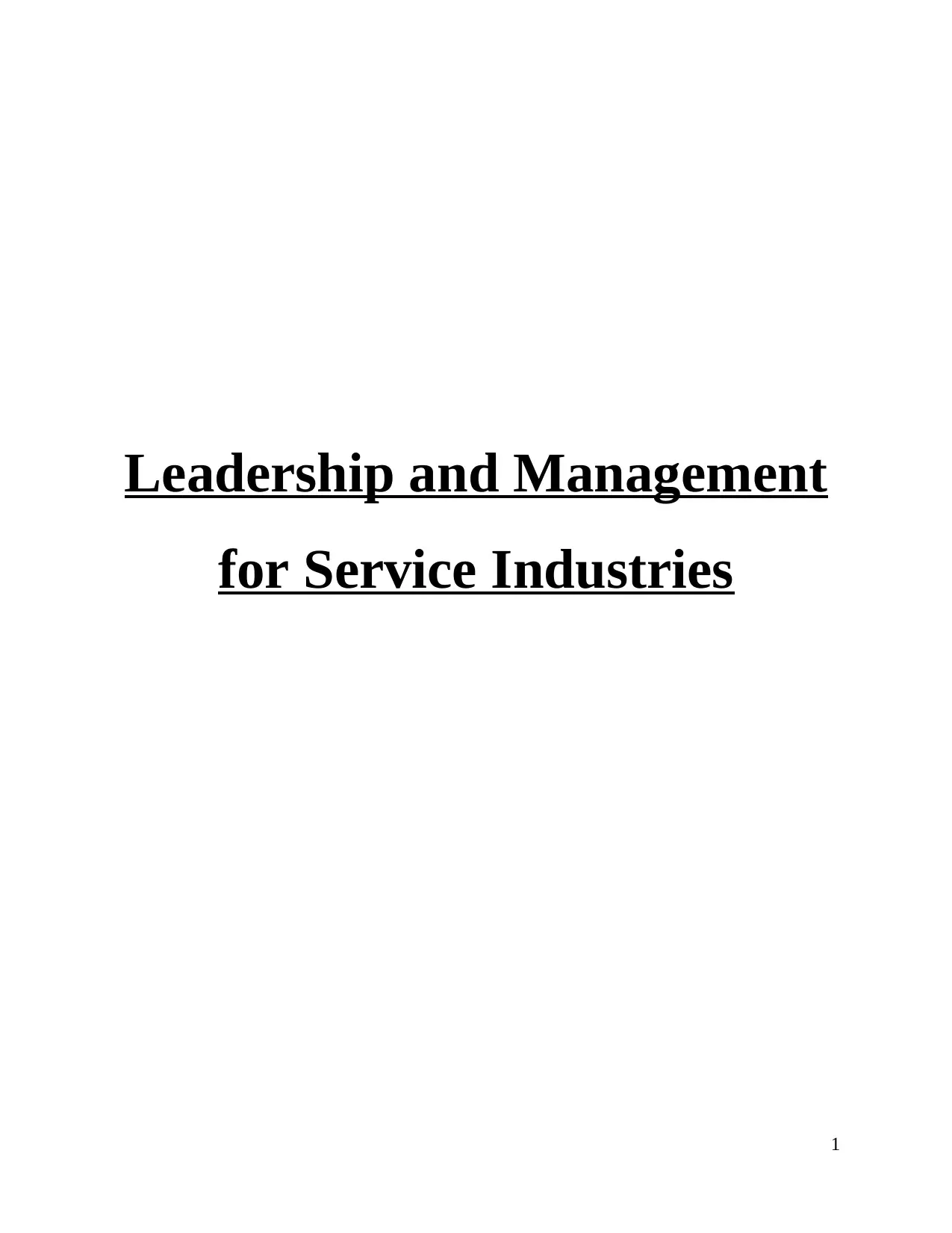
Leadership and Management
for Service Industries
1
for Service Industries
1
Paraphrase This Document
Need a fresh take? Get an instant paraphrase of this document with our AI Paraphraser
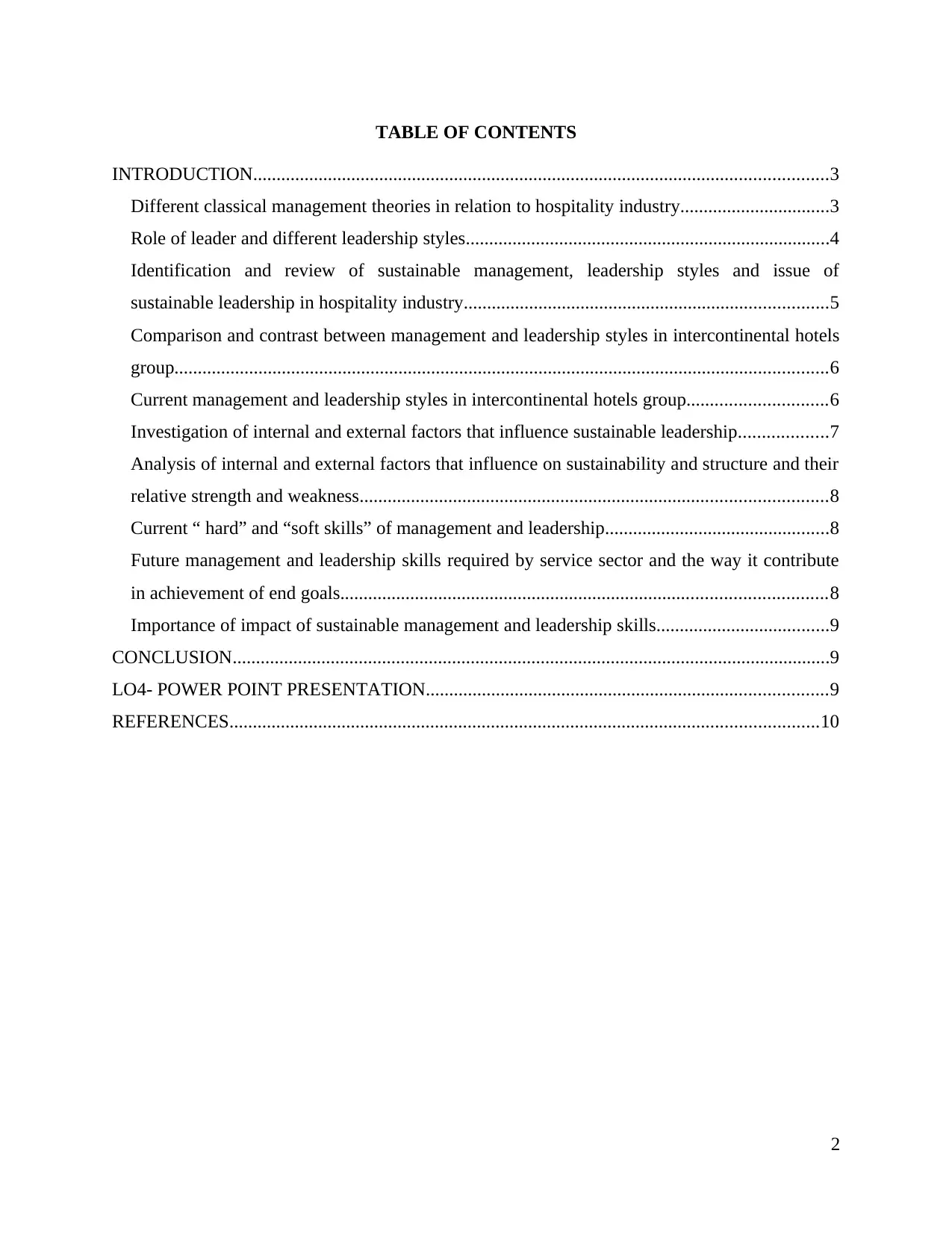
TABLE OF CONTENTS
INTRODUCTION...........................................................................................................................3
Different classical management theories in relation to hospitality industry................................3
Role of leader and different leadership styles..............................................................................4
Identification and review of sustainable management, leadership styles and issue of
sustainable leadership in hospitality industry..............................................................................5
Comparison and contrast between management and leadership styles in intercontinental hotels
group............................................................................................................................................6
Current management and leadership styles in intercontinental hotels group..............................6
Investigation of internal and external factors that influence sustainable leadership...................7
Analysis of internal and external factors that influence on sustainability and structure and their
relative strength and weakness....................................................................................................8
Current “ hard” and “soft skills” of management and leadership................................................8
Future management and leadership skills required by service sector and the way it contribute
in achievement of end goals........................................................................................................8
Importance of impact of sustainable management and leadership skills.....................................9
CONCLUSION................................................................................................................................9
LO4- POWER POINT PRESENTATION......................................................................................9
REFERENCES..............................................................................................................................10
2
INTRODUCTION...........................................................................................................................3
Different classical management theories in relation to hospitality industry................................3
Role of leader and different leadership styles..............................................................................4
Identification and review of sustainable management, leadership styles and issue of
sustainable leadership in hospitality industry..............................................................................5
Comparison and contrast between management and leadership styles in intercontinental hotels
group............................................................................................................................................6
Current management and leadership styles in intercontinental hotels group..............................6
Investigation of internal and external factors that influence sustainable leadership...................7
Analysis of internal and external factors that influence on sustainability and structure and their
relative strength and weakness....................................................................................................8
Current “ hard” and “soft skills” of management and leadership................................................8
Future management and leadership skills required by service sector and the way it contribute
in achievement of end goals........................................................................................................8
Importance of impact of sustainable management and leadership skills.....................................9
CONCLUSION................................................................................................................................9
LO4- POWER POINT PRESENTATION......................................................................................9
REFERENCES..............................................................................................................................10
2
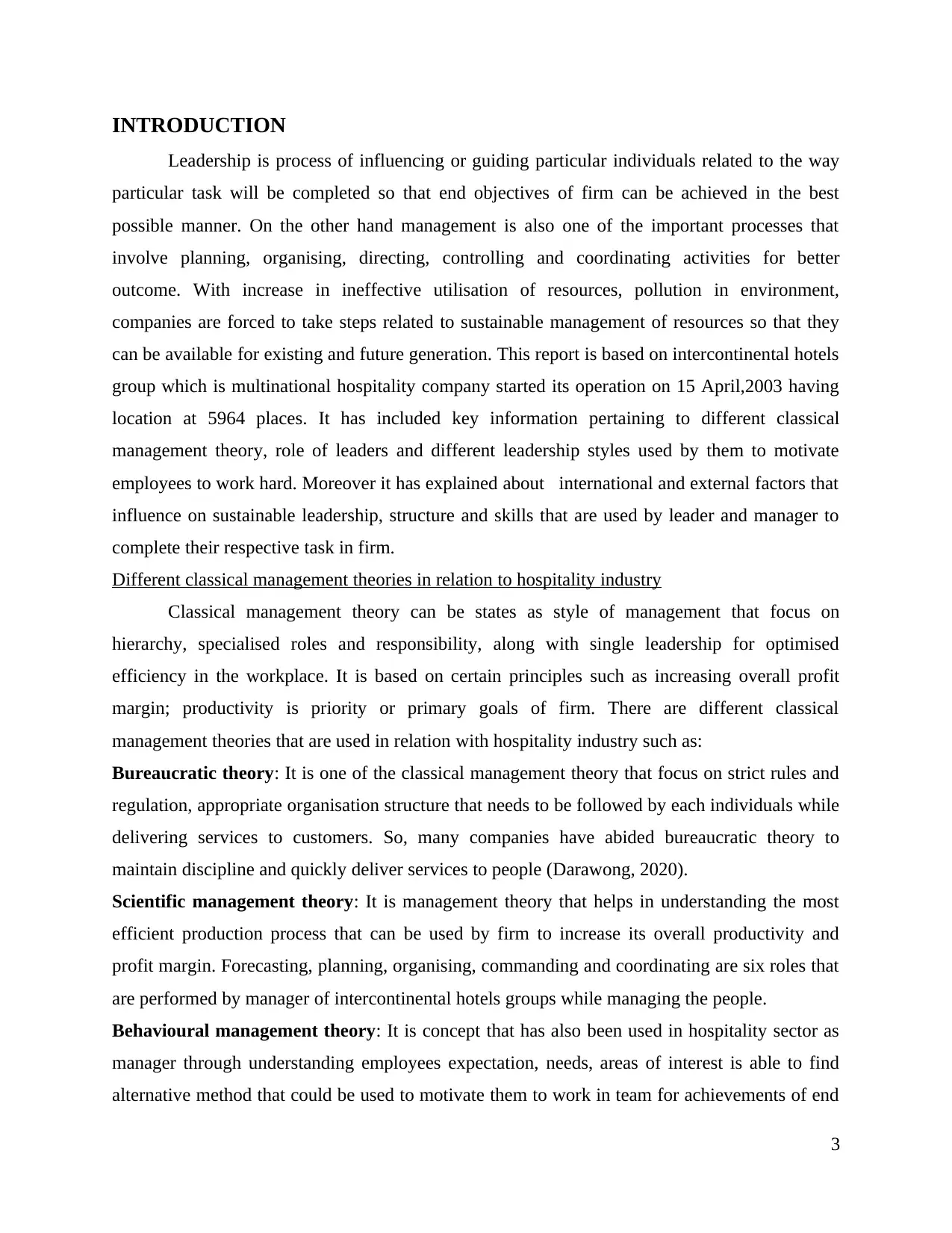
INTRODUCTION
Leadership is process of influencing or guiding particular individuals related to the way
particular task will be completed so that end objectives of firm can be achieved in the best
possible manner. On the other hand management is also one of the important processes that
involve planning, organising, directing, controlling and coordinating activities for better
outcome. With increase in ineffective utilisation of resources, pollution in environment,
companies are forced to take steps related to sustainable management of resources so that they
can be available for existing and future generation. This report is based on intercontinental hotels
group which is multinational hospitality company started its operation on 15 April,2003 having
location at 5964 places. It has included key information pertaining to different classical
management theory, role of leaders and different leadership styles used by them to motivate
employees to work hard. Moreover it has explained about international and external factors that
influence on sustainable leadership, structure and skills that are used by leader and manager to
complete their respective task in firm.
Different classical management theories in relation to hospitality industry
Classical management theory can be states as style of management that focus on
hierarchy, specialised roles and responsibility, along with single leadership for optimised
efficiency in the workplace. It is based on certain principles such as increasing overall profit
margin; productivity is priority or primary goals of firm. There are different classical
management theories that are used in relation with hospitality industry such as:
Bureaucratic theory: It is one of the classical management theory that focus on strict rules and
regulation, appropriate organisation structure that needs to be followed by each individuals while
delivering services to customers. So, many companies have abided bureaucratic theory to
maintain discipline and quickly deliver services to people (Darawong, 2020).
Scientific management theory: It is management theory that helps in understanding the most
efficient production process that can be used by firm to increase its overall productivity and
profit margin. Forecasting, planning, organising, commanding and coordinating are six roles that
are performed by manager of intercontinental hotels groups while managing the people.
Behavioural management theory: It is concept that has also been used in hospitality sector as
manager through understanding employees expectation, needs, areas of interest is able to find
alternative method that could be used to motivate them to work in team for achievements of end
3
Leadership is process of influencing or guiding particular individuals related to the way
particular task will be completed so that end objectives of firm can be achieved in the best
possible manner. On the other hand management is also one of the important processes that
involve planning, organising, directing, controlling and coordinating activities for better
outcome. With increase in ineffective utilisation of resources, pollution in environment,
companies are forced to take steps related to sustainable management of resources so that they
can be available for existing and future generation. This report is based on intercontinental hotels
group which is multinational hospitality company started its operation on 15 April,2003 having
location at 5964 places. It has included key information pertaining to different classical
management theory, role of leaders and different leadership styles used by them to motivate
employees to work hard. Moreover it has explained about international and external factors that
influence on sustainable leadership, structure and skills that are used by leader and manager to
complete their respective task in firm.
Different classical management theories in relation to hospitality industry
Classical management theory can be states as style of management that focus on
hierarchy, specialised roles and responsibility, along with single leadership for optimised
efficiency in the workplace. It is based on certain principles such as increasing overall profit
margin; productivity is priority or primary goals of firm. There are different classical
management theories that are used in relation with hospitality industry such as:
Bureaucratic theory: It is one of the classical management theory that focus on strict rules and
regulation, appropriate organisation structure that needs to be followed by each individuals while
delivering services to customers. So, many companies have abided bureaucratic theory to
maintain discipline and quickly deliver services to people (Darawong, 2020).
Scientific management theory: It is management theory that helps in understanding the most
efficient production process that can be used by firm to increase its overall productivity and
profit margin. Forecasting, planning, organising, commanding and coordinating are six roles that
are performed by manager of intercontinental hotels groups while managing the people.
Behavioural management theory: It is concept that has also been used in hospitality sector as
manager through understanding employees expectation, needs, areas of interest is able to find
alternative method that could be used to motivate them to work in team for achievements of end
3
⊘ This is a preview!⊘
Do you want full access?
Subscribe today to unlock all pages.

Trusted by 1+ million students worldwide
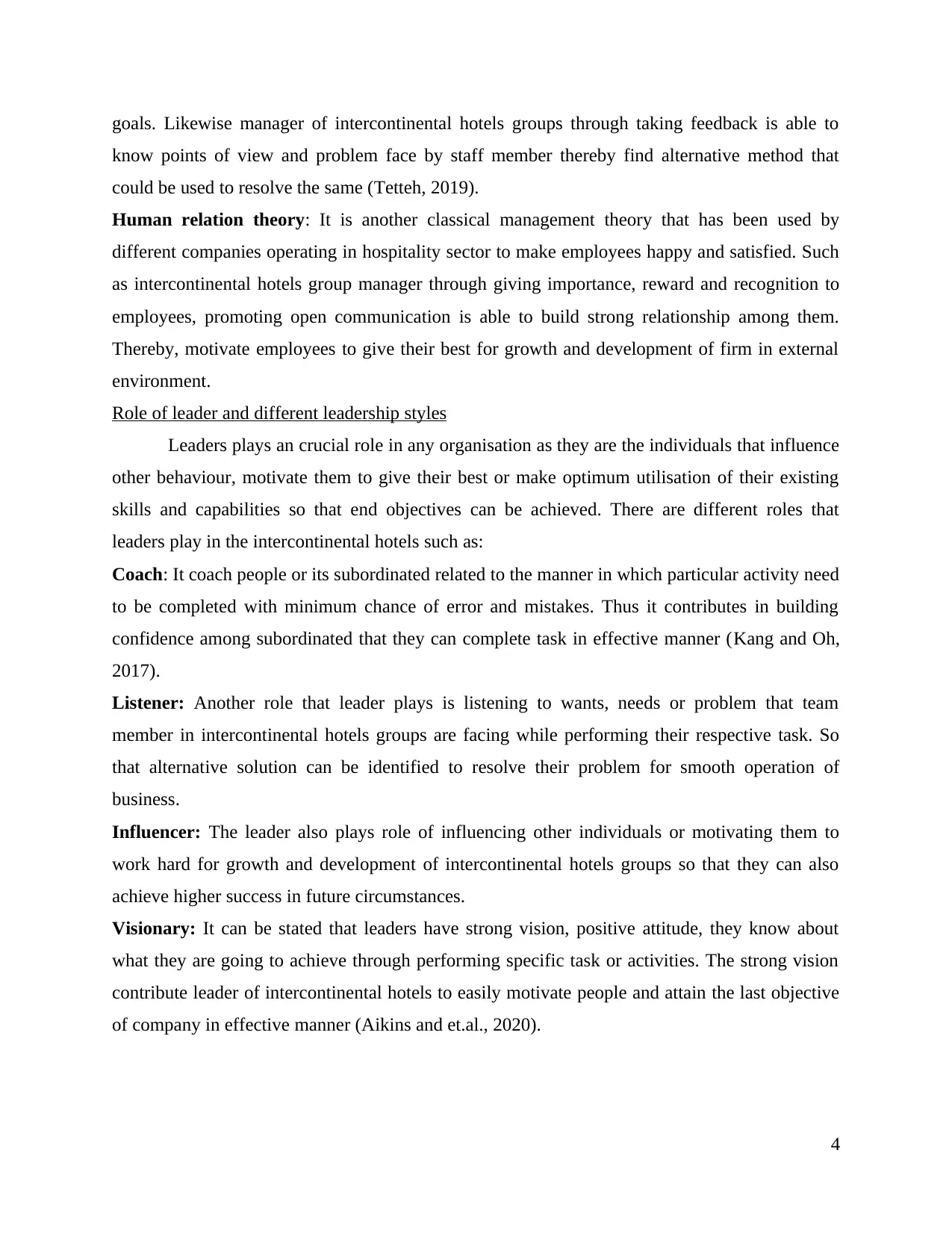
goals. Likewise manager of intercontinental hotels groups through taking feedback is able to
know points of view and problem face by staff member thereby find alternative method that
could be used to resolve the same (Tetteh, 2019).
Human relation theory: It is another classical management theory that has been used by
different companies operating in hospitality sector to make employees happy and satisfied. Such
as intercontinental hotels group manager through giving importance, reward and recognition to
employees, promoting open communication is able to build strong relationship among them.
Thereby, motivate employees to give their best for growth and development of firm in external
environment.
Role of leader and different leadership styles
Leaders plays an crucial role in any organisation as they are the individuals that influence
other behaviour, motivate them to give their best or make optimum utilisation of their existing
skills and capabilities so that end objectives can be achieved. There are different roles that
leaders play in the intercontinental hotels such as:
Coach: It coach people or its subordinated related to the manner in which particular activity need
to be completed with minimum chance of error and mistakes. Thus it contributes in building
confidence among subordinated that they can complete task in effective manner (Kang and Oh,
2017).
Listener: Another role that leader plays is listening to wants, needs or problem that team
member in intercontinental hotels groups are facing while performing their respective task. So
that alternative solution can be identified to resolve their problem for smooth operation of
business.
Influencer: The leader also plays role of influencing other individuals or motivating them to
work hard for growth and development of intercontinental hotels groups so that they can also
achieve higher success in future circumstances.
Visionary: It can be stated that leaders have strong vision, positive attitude, they know about
what they are going to achieve through performing specific task or activities. The strong vision
contribute leader of intercontinental hotels to easily motivate people and attain the last objective
of company in effective manner (Aikins and et.al., 2020).
4
know points of view and problem face by staff member thereby find alternative method that
could be used to resolve the same (Tetteh, 2019).
Human relation theory: It is another classical management theory that has been used by
different companies operating in hospitality sector to make employees happy and satisfied. Such
as intercontinental hotels group manager through giving importance, reward and recognition to
employees, promoting open communication is able to build strong relationship among them.
Thereby, motivate employees to give their best for growth and development of firm in external
environment.
Role of leader and different leadership styles
Leaders plays an crucial role in any organisation as they are the individuals that influence
other behaviour, motivate them to give their best or make optimum utilisation of their existing
skills and capabilities so that end objectives can be achieved. There are different roles that
leaders play in the intercontinental hotels such as:
Coach: It coach people or its subordinated related to the manner in which particular activity need
to be completed with minimum chance of error and mistakes. Thus it contributes in building
confidence among subordinated that they can complete task in effective manner (Kang and Oh,
2017).
Listener: Another role that leader plays is listening to wants, needs or problem that team
member in intercontinental hotels groups are facing while performing their respective task. So
that alternative solution can be identified to resolve their problem for smooth operation of
business.
Influencer: The leader also plays role of influencing other individuals or motivating them to
work hard for growth and development of intercontinental hotels groups so that they can also
achieve higher success in future circumstances.
Visionary: It can be stated that leaders have strong vision, positive attitude, they know about
what they are going to achieve through performing specific task or activities. The strong vision
contribute leader of intercontinental hotels to easily motivate people and attain the last objective
of company in effective manner (Aikins and et.al., 2020).
4
Paraphrase This Document
Need a fresh take? Get an instant paraphrase of this document with our AI Paraphraser
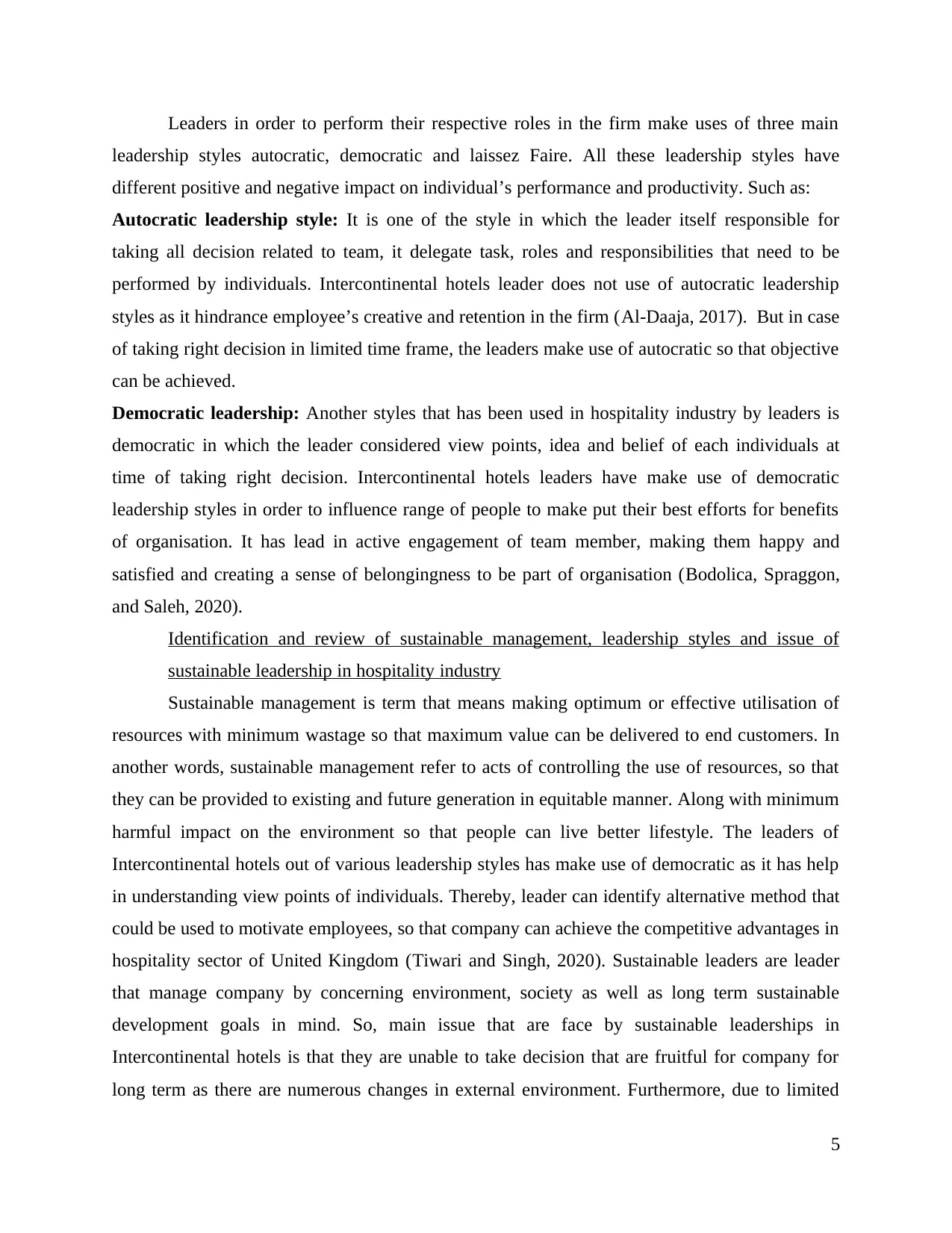
Leaders in order to perform their respective roles in the firm make uses of three main
leadership styles autocratic, democratic and laissez Faire. All these leadership styles have
different positive and negative impact on individual’s performance and productivity. Such as:
Autocratic leadership style: It is one of the style in which the leader itself responsible for
taking all decision related to team, it delegate task, roles and responsibilities that need to be
performed by individuals. Intercontinental hotels leader does not use of autocratic leadership
styles as it hindrance employee’s creative and retention in the firm (Al-Daaja, 2017). But in case
of taking right decision in limited time frame, the leaders make use of autocratic so that objective
can be achieved.
Democratic leadership: Another styles that has been used in hospitality industry by leaders is
democratic in which the leader considered view points, idea and belief of each individuals at
time of taking right decision. Intercontinental hotels leaders have make use of democratic
leadership styles in order to influence range of people to make put their best efforts for benefits
of organisation. It has lead in active engagement of team member, making them happy and
satisfied and creating a sense of belongingness to be part of organisation (Bodolica, Spraggon,
and Saleh, 2020).
Identification and review of sustainable management, leadership styles and issue of
sustainable leadership in hospitality industry
Sustainable management is term that means making optimum or effective utilisation of
resources with minimum wastage so that maximum value can be delivered to end customers. In
another words, sustainable management refer to acts of controlling the use of resources, so that
they can be provided to existing and future generation in equitable manner. Along with minimum
harmful impact on the environment so that people can live better lifestyle. The leaders of
Intercontinental hotels out of various leadership styles has make use of democratic as it has help
in understanding view points of individuals. Thereby, leader can identify alternative method that
could be used to motivate employees, so that company can achieve the competitive advantages in
hospitality sector of United Kingdom (Tiwari and Singh, 2020). Sustainable leaders are leader
that manage company by concerning environment, society as well as long term sustainable
development goals in mind. So, main issue that are face by sustainable leaderships in
Intercontinental hotels is that they are unable to take decision that are fruitful for company for
long term as there are numerous changes in external environment. Furthermore, due to limited
5
leadership styles autocratic, democratic and laissez Faire. All these leadership styles have
different positive and negative impact on individual’s performance and productivity. Such as:
Autocratic leadership style: It is one of the style in which the leader itself responsible for
taking all decision related to team, it delegate task, roles and responsibilities that need to be
performed by individuals. Intercontinental hotels leader does not use of autocratic leadership
styles as it hindrance employee’s creative and retention in the firm (Al-Daaja, 2017). But in case
of taking right decision in limited time frame, the leaders make use of autocratic so that objective
can be achieved.
Democratic leadership: Another styles that has been used in hospitality industry by leaders is
democratic in which the leader considered view points, idea and belief of each individuals at
time of taking right decision. Intercontinental hotels leaders have make use of democratic
leadership styles in order to influence range of people to make put their best efforts for benefits
of organisation. It has lead in active engagement of team member, making them happy and
satisfied and creating a sense of belongingness to be part of organisation (Bodolica, Spraggon,
and Saleh, 2020).
Identification and review of sustainable management, leadership styles and issue of
sustainable leadership in hospitality industry
Sustainable management is term that means making optimum or effective utilisation of
resources with minimum wastage so that maximum value can be delivered to end customers. In
another words, sustainable management refer to acts of controlling the use of resources, so that
they can be provided to existing and future generation in equitable manner. Along with minimum
harmful impact on the environment so that people can live better lifestyle. The leaders of
Intercontinental hotels out of various leadership styles has make use of democratic as it has help
in understanding view points of individuals. Thereby, leader can identify alternative method that
could be used to motivate employees, so that company can achieve the competitive advantages in
hospitality sector of United Kingdom (Tiwari and Singh, 2020). Sustainable leaders are leader
that manage company by concerning environment, society as well as long term sustainable
development goals in mind. So, main issue that are face by sustainable leaderships in
Intercontinental hotels is that they are unable to take decision that are fruitful for company for
long term as there are numerous changes in external environment. Furthermore, due to limited
5
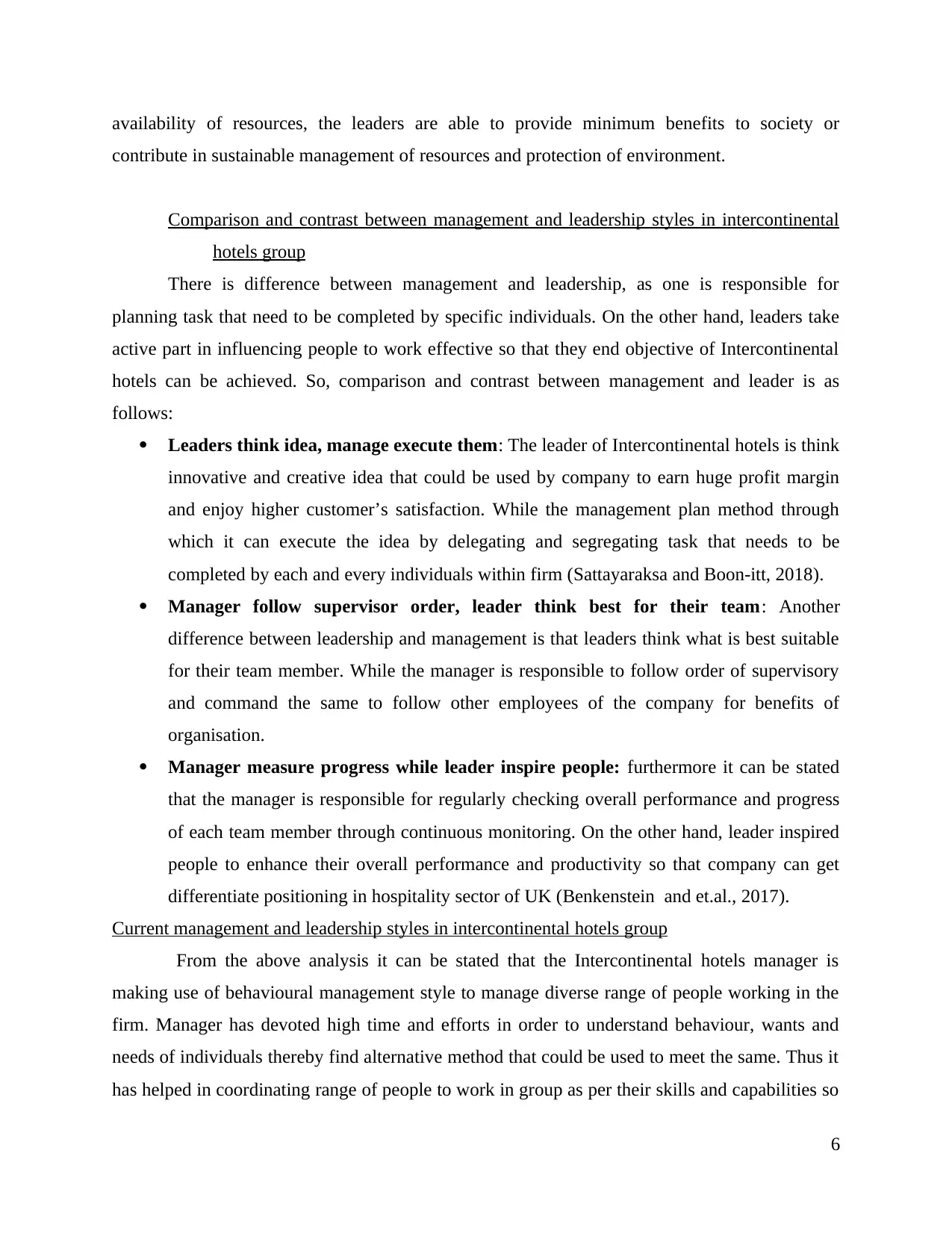
availability of resources, the leaders are able to provide minimum benefits to society or
contribute in sustainable management of resources and protection of environment.
Comparison and contrast between management and leadership styles in intercontinental
hotels group
There is difference between management and leadership, as one is responsible for
planning task that need to be completed by specific individuals. On the other hand, leaders take
active part in influencing people to work effective so that they end objective of Intercontinental
hotels can be achieved. So, comparison and contrast between management and leader is as
follows:
Leaders think idea, manage execute them: The leader of Intercontinental hotels is think
innovative and creative idea that could be used by company to earn huge profit margin
and enjoy higher customer’s satisfaction. While the management plan method through
which it can execute the idea by delegating and segregating task that needs to be
completed by each and every individuals within firm (Sattayaraksa and Boon-itt, 2018).
Manager follow supervisor order, leader think best for their team: Another
difference between leadership and management is that leaders think what is best suitable
for their team member. While the manager is responsible to follow order of supervisory
and command the same to follow other employees of the company for benefits of
organisation.
Manager measure progress while leader inspire people: furthermore it can be stated
that the manager is responsible for regularly checking overall performance and progress
of each team member through continuous monitoring. On the other hand, leader inspired
people to enhance their overall performance and productivity so that company can get
differentiate positioning in hospitality sector of UK (Benkenstein and et.al., 2017).
Current management and leadership styles in intercontinental hotels group
From the above analysis it can be stated that the Intercontinental hotels manager is
making use of behavioural management style to manage diverse range of people working in the
firm. Manager has devoted high time and efforts in order to understand behaviour, wants and
needs of individuals thereby find alternative method that could be used to meet the same. Thus it
has helped in coordinating range of people to work in group as per their skills and capabilities so
6
contribute in sustainable management of resources and protection of environment.
Comparison and contrast between management and leadership styles in intercontinental
hotels group
There is difference between management and leadership, as one is responsible for
planning task that need to be completed by specific individuals. On the other hand, leaders take
active part in influencing people to work effective so that they end objective of Intercontinental
hotels can be achieved. So, comparison and contrast between management and leader is as
follows:
Leaders think idea, manage execute them: The leader of Intercontinental hotels is think
innovative and creative idea that could be used by company to earn huge profit margin
and enjoy higher customer’s satisfaction. While the management plan method through
which it can execute the idea by delegating and segregating task that needs to be
completed by each and every individuals within firm (Sattayaraksa and Boon-itt, 2018).
Manager follow supervisor order, leader think best for their team: Another
difference between leadership and management is that leaders think what is best suitable
for their team member. While the manager is responsible to follow order of supervisory
and command the same to follow other employees of the company for benefits of
organisation.
Manager measure progress while leader inspire people: furthermore it can be stated
that the manager is responsible for regularly checking overall performance and progress
of each team member through continuous monitoring. On the other hand, leader inspired
people to enhance their overall performance and productivity so that company can get
differentiate positioning in hospitality sector of UK (Benkenstein and et.al., 2017).
Current management and leadership styles in intercontinental hotels group
From the above analysis it can be stated that the Intercontinental hotels manager is
making use of behavioural management style to manage diverse range of people working in the
firm. Manager has devoted high time and efforts in order to understand behaviour, wants and
needs of individuals thereby find alternative method that could be used to meet the same. Thus it
has helped in coordinating range of people to work in group as per their skills and capabilities so
6
⊘ This is a preview!⊘
Do you want full access?
Subscribe today to unlock all pages.

Trusted by 1+ million students worldwide
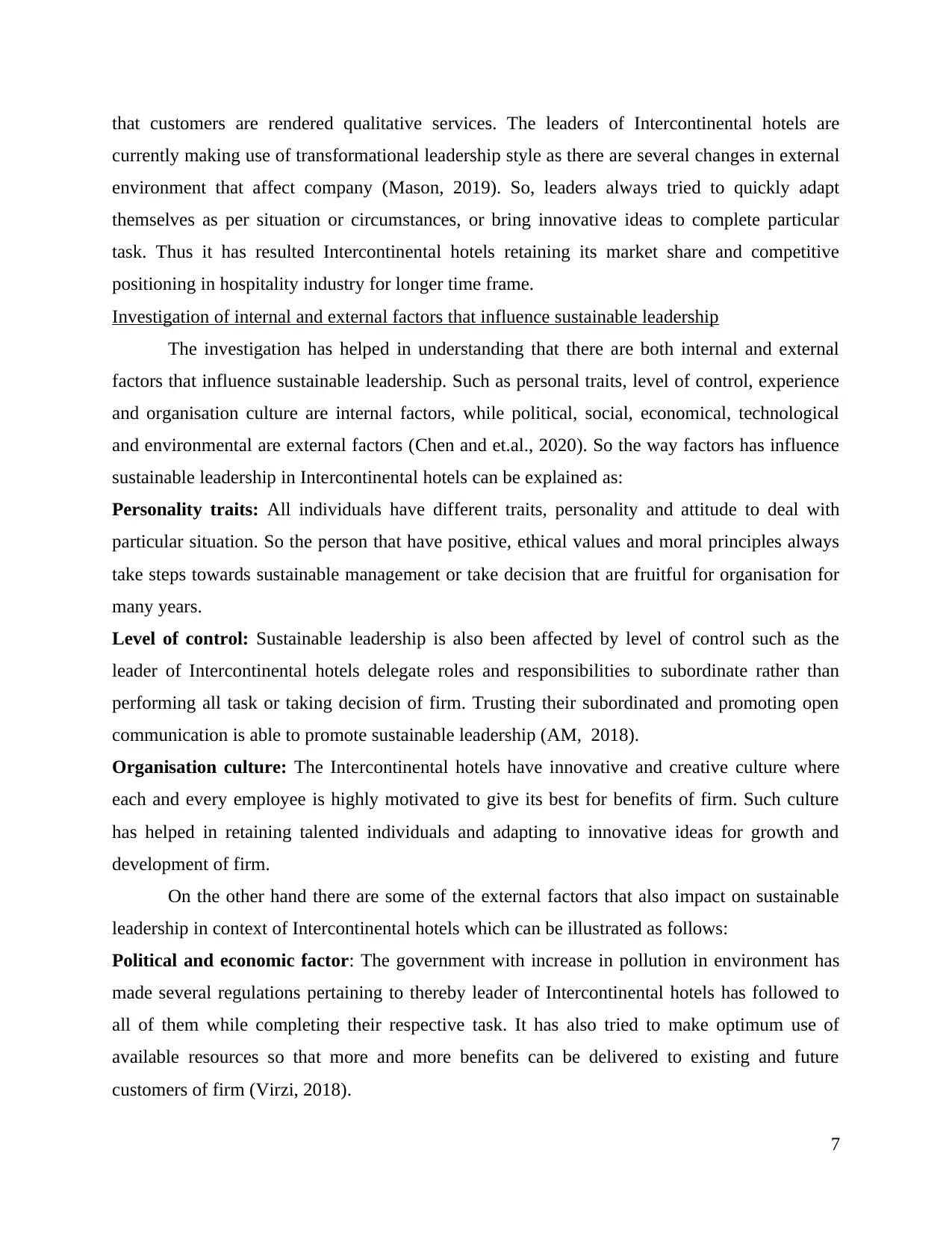
that customers are rendered qualitative services. The leaders of Intercontinental hotels are
currently making use of transformational leadership style as there are several changes in external
environment that affect company (Mason, 2019). So, leaders always tried to quickly adapt
themselves as per situation or circumstances, or bring innovative ideas to complete particular
task. Thus it has resulted Intercontinental hotels retaining its market share and competitive
positioning in hospitality industry for longer time frame.
Investigation of internal and external factors that influence sustainable leadership
The investigation has helped in understanding that there are both internal and external
factors that influence sustainable leadership. Such as personal traits, level of control, experience
and organisation culture are internal factors, while political, social, economical, technological
and environmental are external factors (Chen and et.al., 2020). So the way factors has influence
sustainable leadership in Intercontinental hotels can be explained as:
Personality traits: All individuals have different traits, personality and attitude to deal with
particular situation. So the person that have positive, ethical values and moral principles always
take steps towards sustainable management or take decision that are fruitful for organisation for
many years.
Level of control: Sustainable leadership is also been affected by level of control such as the
leader of Intercontinental hotels delegate roles and responsibilities to subordinate rather than
performing all task or taking decision of firm. Trusting their subordinated and promoting open
communication is able to promote sustainable leadership (AM, 2018).
Organisation culture: The Intercontinental hotels have innovative and creative culture where
each and every employee is highly motivated to give its best for benefits of firm. Such culture
has helped in retaining talented individuals and adapting to innovative ideas for growth and
development of firm.
On the other hand there are some of the external factors that also impact on sustainable
leadership in context of Intercontinental hotels which can be illustrated as follows:
Political and economic factor: The government with increase in pollution in environment has
made several regulations pertaining to thereby leader of Intercontinental hotels has followed to
all of them while completing their respective task. It has also tried to make optimum use of
available resources so that more and more benefits can be delivered to existing and future
customers of firm (Virzi, 2018).
7
currently making use of transformational leadership style as there are several changes in external
environment that affect company (Mason, 2019). So, leaders always tried to quickly adapt
themselves as per situation or circumstances, or bring innovative ideas to complete particular
task. Thus it has resulted Intercontinental hotels retaining its market share and competitive
positioning in hospitality industry for longer time frame.
Investigation of internal and external factors that influence sustainable leadership
The investigation has helped in understanding that there are both internal and external
factors that influence sustainable leadership. Such as personal traits, level of control, experience
and organisation culture are internal factors, while political, social, economical, technological
and environmental are external factors (Chen and et.al., 2020). So the way factors has influence
sustainable leadership in Intercontinental hotels can be explained as:
Personality traits: All individuals have different traits, personality and attitude to deal with
particular situation. So the person that have positive, ethical values and moral principles always
take steps towards sustainable management or take decision that are fruitful for organisation for
many years.
Level of control: Sustainable leadership is also been affected by level of control such as the
leader of Intercontinental hotels delegate roles and responsibilities to subordinate rather than
performing all task or taking decision of firm. Trusting their subordinated and promoting open
communication is able to promote sustainable leadership (AM, 2018).
Organisation culture: The Intercontinental hotels have innovative and creative culture where
each and every employee is highly motivated to give its best for benefits of firm. Such culture
has helped in retaining talented individuals and adapting to innovative ideas for growth and
development of firm.
On the other hand there are some of the external factors that also impact on sustainable
leadership in context of Intercontinental hotels which can be illustrated as follows:
Political and economic factor: The government with increase in pollution in environment has
made several regulations pertaining to thereby leader of Intercontinental hotels has followed to
all of them while completing their respective task. It has also tried to make optimum use of
available resources so that more and more benefits can be delivered to existing and future
customers of firm (Virzi, 2018).
7
Paraphrase This Document
Need a fresh take? Get an instant paraphrase of this document with our AI Paraphraser
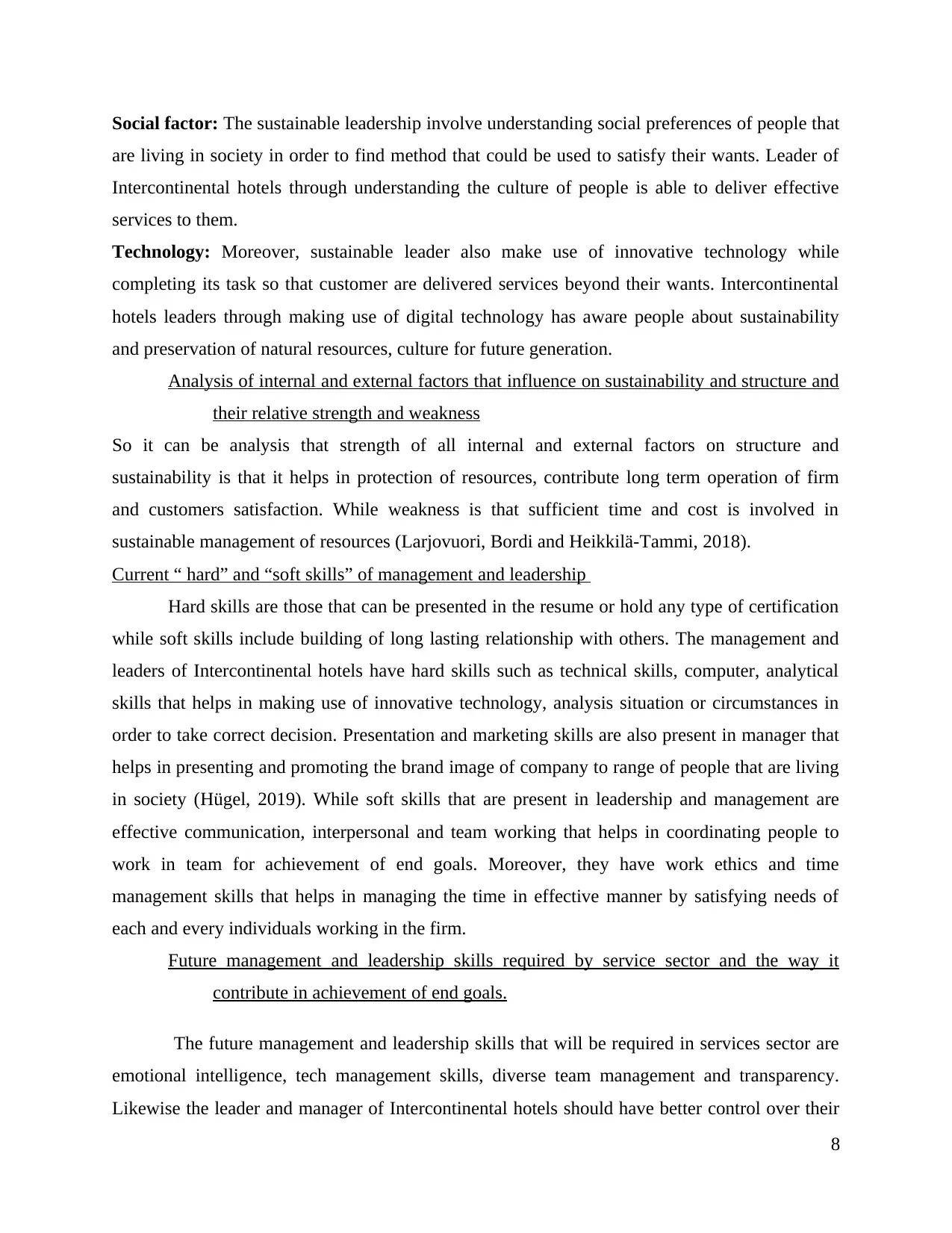
Social factor: The sustainable leadership involve understanding social preferences of people that
are living in society in order to find method that could be used to satisfy their wants. Leader of
Intercontinental hotels through understanding the culture of people is able to deliver effective
services to them.
Technology: Moreover, sustainable leader also make use of innovative technology while
completing its task so that customer are delivered services beyond their wants. Intercontinental
hotels leaders through making use of digital technology has aware people about sustainability
and preservation of natural resources, culture for future generation.
Analysis of internal and external factors that influence on sustainability and structure and
their relative strength and weakness
So it can be analysis that strength of all internal and external factors on structure and
sustainability is that it helps in protection of resources, contribute long term operation of firm
and customers satisfaction. While weakness is that sufficient time and cost is involved in
sustainable management of resources (Larjovuori, Bordi and Heikkilä-Tammi, 2018).
Current “ hard” and “soft skills” of management and leadership
Hard skills are those that can be presented in the resume or hold any type of certification
while soft skills include building of long lasting relationship with others. The management and
leaders of Intercontinental hotels have hard skills such as technical skills, computer, analytical
skills that helps in making use of innovative technology, analysis situation or circumstances in
order to take correct decision. Presentation and marketing skills are also present in manager that
helps in presenting and promoting the brand image of company to range of people that are living
in society (Hügel, 2019). While soft skills that are present in leadership and management are
effective communication, interpersonal and team working that helps in coordinating people to
work in team for achievement of end goals. Moreover, they have work ethics and time
management skills that helps in managing the time in effective manner by satisfying needs of
each and every individuals working in the firm.
Future management and leadership skills required by service sector and the way it
contribute in achievement of end goals.
The future management and leadership skills that will be required in services sector are
emotional intelligence, tech management skills, diverse team management and transparency.
Likewise the leader and manager of Intercontinental hotels should have better control over their
8
are living in society in order to find method that could be used to satisfy their wants. Leader of
Intercontinental hotels through understanding the culture of people is able to deliver effective
services to them.
Technology: Moreover, sustainable leader also make use of innovative technology while
completing its task so that customer are delivered services beyond their wants. Intercontinental
hotels leaders through making use of digital technology has aware people about sustainability
and preservation of natural resources, culture for future generation.
Analysis of internal and external factors that influence on sustainability and structure and
their relative strength and weakness
So it can be analysis that strength of all internal and external factors on structure and
sustainability is that it helps in protection of resources, contribute long term operation of firm
and customers satisfaction. While weakness is that sufficient time and cost is involved in
sustainable management of resources (Larjovuori, Bordi and Heikkilä-Tammi, 2018).
Current “ hard” and “soft skills” of management and leadership
Hard skills are those that can be presented in the resume or hold any type of certification
while soft skills include building of long lasting relationship with others. The management and
leaders of Intercontinental hotels have hard skills such as technical skills, computer, analytical
skills that helps in making use of innovative technology, analysis situation or circumstances in
order to take correct decision. Presentation and marketing skills are also present in manager that
helps in presenting and promoting the brand image of company to range of people that are living
in society (Hügel, 2019). While soft skills that are present in leadership and management are
effective communication, interpersonal and team working that helps in coordinating people to
work in team for achievement of end goals. Moreover, they have work ethics and time
management skills that helps in managing the time in effective manner by satisfying needs of
each and every individuals working in the firm.
Future management and leadership skills required by service sector and the way it
contribute in achievement of end goals.
The future management and leadership skills that will be required in services sector are
emotional intelligence, tech management skills, diverse team management and transparency.
Likewise the leader and manager of Intercontinental hotels should have better control over their
8
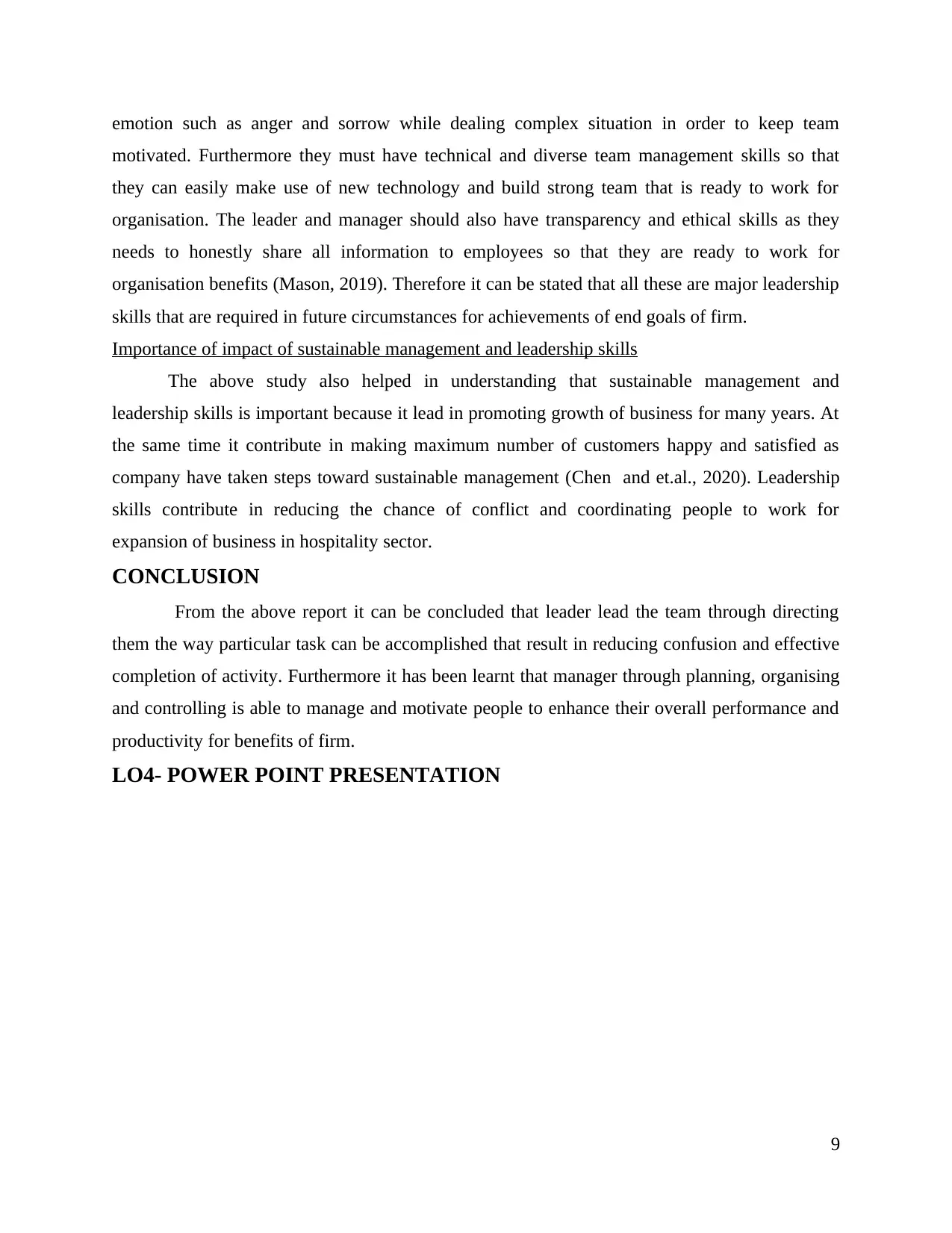
emotion such as anger and sorrow while dealing complex situation in order to keep team
motivated. Furthermore they must have technical and diverse team management skills so that
they can easily make use of new technology and build strong team that is ready to work for
organisation. The leader and manager should also have transparency and ethical skills as they
needs to honestly share all information to employees so that they are ready to work for
organisation benefits (Mason, 2019). Therefore it can be stated that all these are major leadership
skills that are required in future circumstances for achievements of end goals of firm.
Importance of impact of sustainable management and leadership skills
The above study also helped in understanding that sustainable management and
leadership skills is important because it lead in promoting growth of business for many years. At
the same time it contribute in making maximum number of customers happy and satisfied as
company have taken steps toward sustainable management (Chen and et.al., 2020). Leadership
skills contribute in reducing the chance of conflict and coordinating people to work for
expansion of business in hospitality sector.
CONCLUSION
From the above report it can be concluded that leader lead the team through directing
them the way particular task can be accomplished that result in reducing confusion and effective
completion of activity. Furthermore it has been learnt that manager through planning, organising
and controlling is able to manage and motivate people to enhance their overall performance and
productivity for benefits of firm.
LO4- POWER POINT PRESENTATION
9
motivated. Furthermore they must have technical and diverse team management skills so that
they can easily make use of new technology and build strong team that is ready to work for
organisation. The leader and manager should also have transparency and ethical skills as they
needs to honestly share all information to employees so that they are ready to work for
organisation benefits (Mason, 2019). Therefore it can be stated that all these are major leadership
skills that are required in future circumstances for achievements of end goals of firm.
Importance of impact of sustainable management and leadership skills
The above study also helped in understanding that sustainable management and
leadership skills is important because it lead in promoting growth of business for many years. At
the same time it contribute in making maximum number of customers happy and satisfied as
company have taken steps toward sustainable management (Chen and et.al., 2020). Leadership
skills contribute in reducing the chance of conflict and coordinating people to work for
expansion of business in hospitality sector.
CONCLUSION
From the above report it can be concluded that leader lead the team through directing
them the way particular task can be accomplished that result in reducing confusion and effective
completion of activity. Furthermore it has been learnt that manager through planning, organising
and controlling is able to manage and motivate people to enhance their overall performance and
productivity for benefits of firm.
LO4- POWER POINT PRESENTATION
9
⊘ This is a preview!⊘
Do you want full access?
Subscribe today to unlock all pages.

Trusted by 1+ million students worldwide
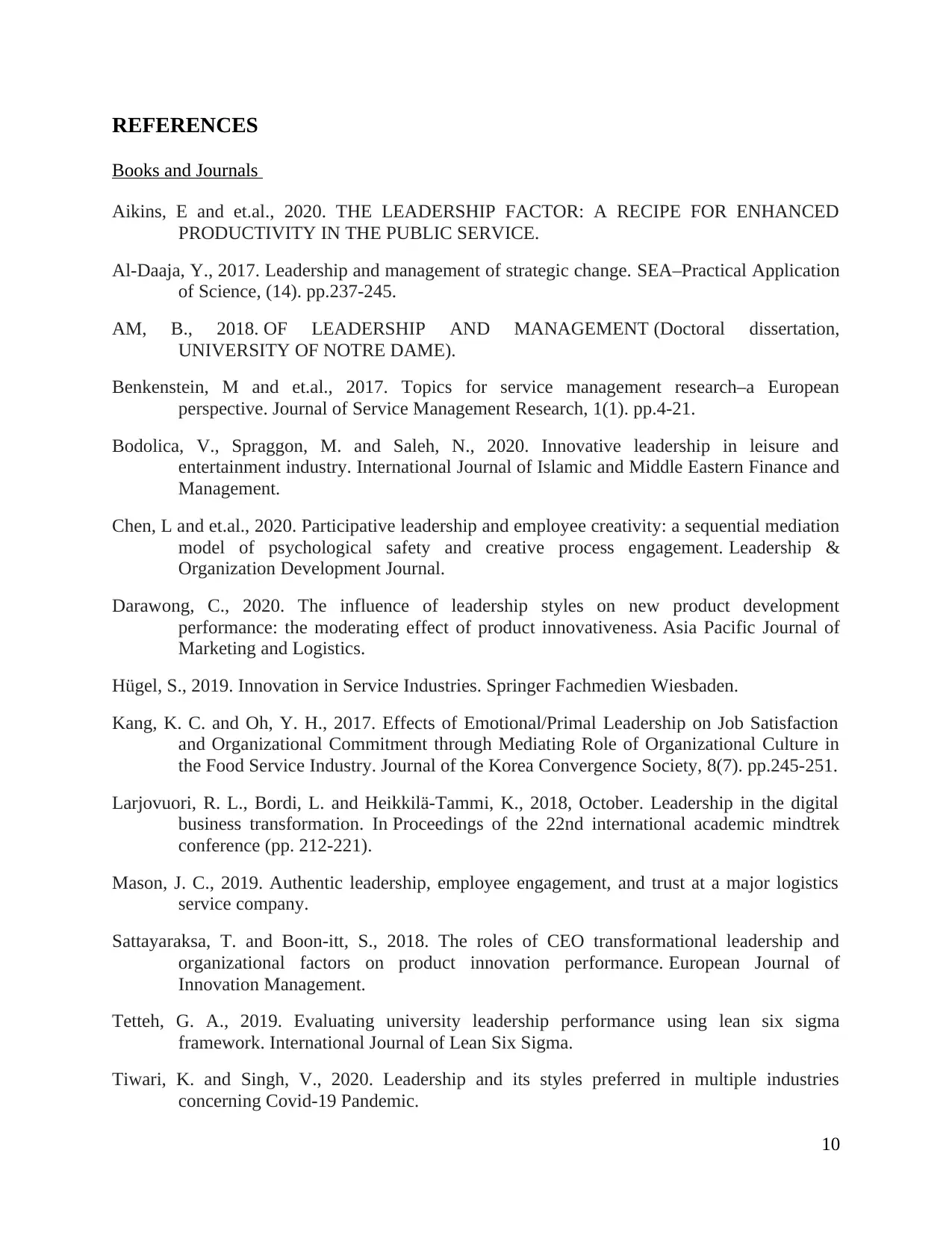
REFERENCES
Books and Journals
Aikins, E and et.al., 2020. THE LEADERSHIP FACTOR: A RECIPE FOR ENHANCED
PRODUCTIVITY IN THE PUBLIC SERVICE.
Al-Daaja, Y., 2017. Leadership and management of strategic change. SEA–Practical Application
of Science, (14). pp.237-245.
AM, B., 2018. OF LEADERSHIP AND MANAGEMENT (Doctoral dissertation,
UNIVERSITY OF NOTRE DAME).
Benkenstein, M and et.al., 2017. Topics for service management research–a European
perspective. Journal of Service Management Research, 1(1). pp.4-21.
Bodolica, V., Spraggon, M. and Saleh, N., 2020. Innovative leadership in leisure and
entertainment industry. International Journal of Islamic and Middle Eastern Finance and
Management.
Chen, L and et.al., 2020. Participative leadership and employee creativity: a sequential mediation
model of psychological safety and creative process engagement. Leadership &
Organization Development Journal.
Darawong, C., 2020. The influence of leadership styles on new product development
performance: the moderating effect of product innovativeness. Asia Pacific Journal of
Marketing and Logistics.
Hügel, S., 2019. Innovation in Service Industries. Springer Fachmedien Wiesbaden.
Kang, K. C. and Oh, Y. H., 2017. Effects of Emotional/Primal Leadership on Job Satisfaction
and Organizational Commitment through Mediating Role of Organizational Culture in
the Food Service Industry. Journal of the Korea Convergence Society, 8(7). pp.245-251.
Larjovuori, R. L., Bordi, L. and Heikkilä-Tammi, K., 2018, October. Leadership in the digital
business transformation. In Proceedings of the 22nd international academic mindtrek
conference (pp. 212-221).
Mason, J. C., 2019. Authentic leadership, employee engagement, and trust at a major logistics
service company.
Sattayaraksa, T. and Boon-itt, S., 2018. The roles of CEO transformational leadership and
organizational factors on product innovation performance. European Journal of
Innovation Management.
Tetteh, G. A., 2019. Evaluating university leadership performance using lean six sigma
framework. International Journal of Lean Six Sigma.
Tiwari, K. and Singh, V., 2020. Leadership and its styles preferred in multiple industries
concerning Covid-19 Pandemic.
10
Books and Journals
Aikins, E and et.al., 2020. THE LEADERSHIP FACTOR: A RECIPE FOR ENHANCED
PRODUCTIVITY IN THE PUBLIC SERVICE.
Al-Daaja, Y., 2017. Leadership and management of strategic change. SEA–Practical Application
of Science, (14). pp.237-245.
AM, B., 2018. OF LEADERSHIP AND MANAGEMENT (Doctoral dissertation,
UNIVERSITY OF NOTRE DAME).
Benkenstein, M and et.al., 2017. Topics for service management research–a European
perspective. Journal of Service Management Research, 1(1). pp.4-21.
Bodolica, V., Spraggon, M. and Saleh, N., 2020. Innovative leadership in leisure and
entertainment industry. International Journal of Islamic and Middle Eastern Finance and
Management.
Chen, L and et.al., 2020. Participative leadership and employee creativity: a sequential mediation
model of psychological safety and creative process engagement. Leadership &
Organization Development Journal.
Darawong, C., 2020. The influence of leadership styles on new product development
performance: the moderating effect of product innovativeness. Asia Pacific Journal of
Marketing and Logistics.
Hügel, S., 2019. Innovation in Service Industries. Springer Fachmedien Wiesbaden.
Kang, K. C. and Oh, Y. H., 2017. Effects of Emotional/Primal Leadership on Job Satisfaction
and Organizational Commitment through Mediating Role of Organizational Culture in
the Food Service Industry. Journal of the Korea Convergence Society, 8(7). pp.245-251.
Larjovuori, R. L., Bordi, L. and Heikkilä-Tammi, K., 2018, October. Leadership in the digital
business transformation. In Proceedings of the 22nd international academic mindtrek
conference (pp. 212-221).
Mason, J. C., 2019. Authentic leadership, employee engagement, and trust at a major logistics
service company.
Sattayaraksa, T. and Boon-itt, S., 2018. The roles of CEO transformational leadership and
organizational factors on product innovation performance. European Journal of
Innovation Management.
Tetteh, G. A., 2019. Evaluating university leadership performance using lean six sigma
framework. International Journal of Lean Six Sigma.
Tiwari, K. and Singh, V., 2020. Leadership and its styles preferred in multiple industries
concerning Covid-19 Pandemic.
10
Paraphrase This Document
Need a fresh take? Get an instant paraphrase of this document with our AI Paraphraser
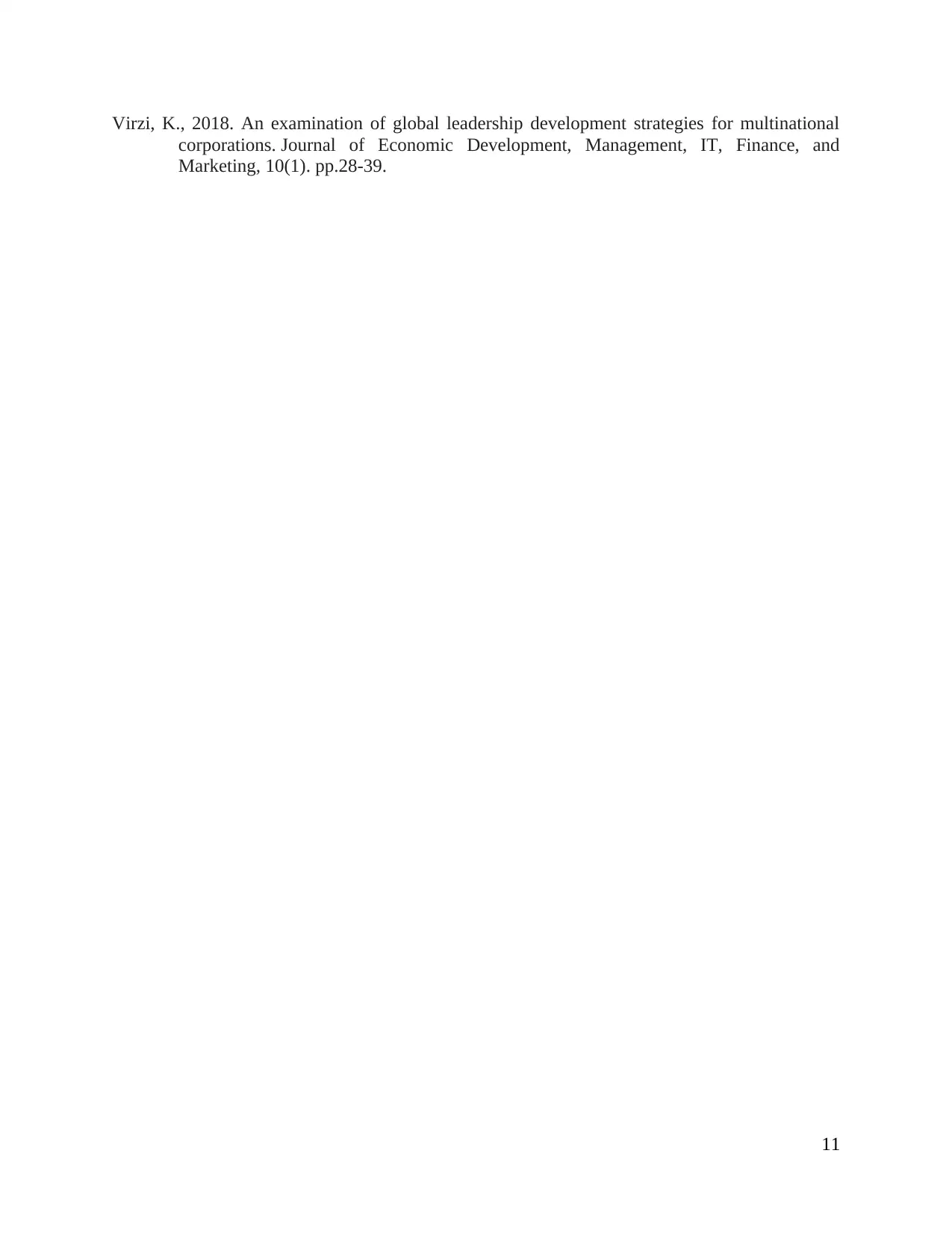
Virzi, K., 2018. An examination of global leadership development strategies for multinational
corporations. Journal of Economic Development, Management, IT, Finance, and
Marketing, 10(1). pp.28-39.
11
corporations. Journal of Economic Development, Management, IT, Finance, and
Marketing, 10(1). pp.28-39.
11

12
⊘ This is a preview!⊘
Do you want full access?
Subscribe today to unlock all pages.

Trusted by 1+ million students worldwide
1 out of 12
Related Documents
Your All-in-One AI-Powered Toolkit for Academic Success.
+13062052269
info@desklib.com
Available 24*7 on WhatsApp / Email
![[object Object]](/_next/static/media/star-bottom.7253800d.svg)
Unlock your academic potential
Copyright © 2020–2026 A2Z Services. All Rights Reserved. Developed and managed by ZUCOL.





